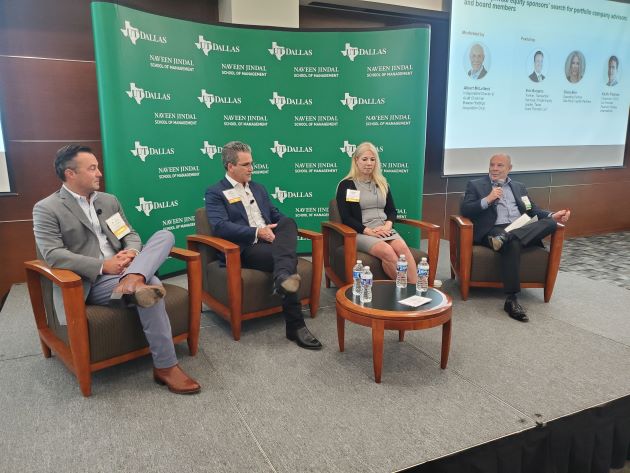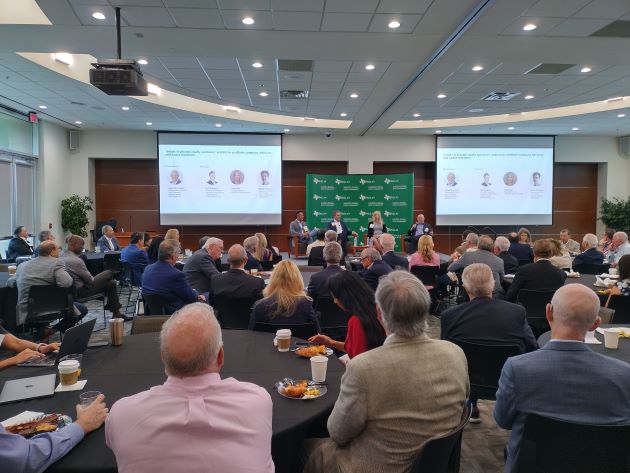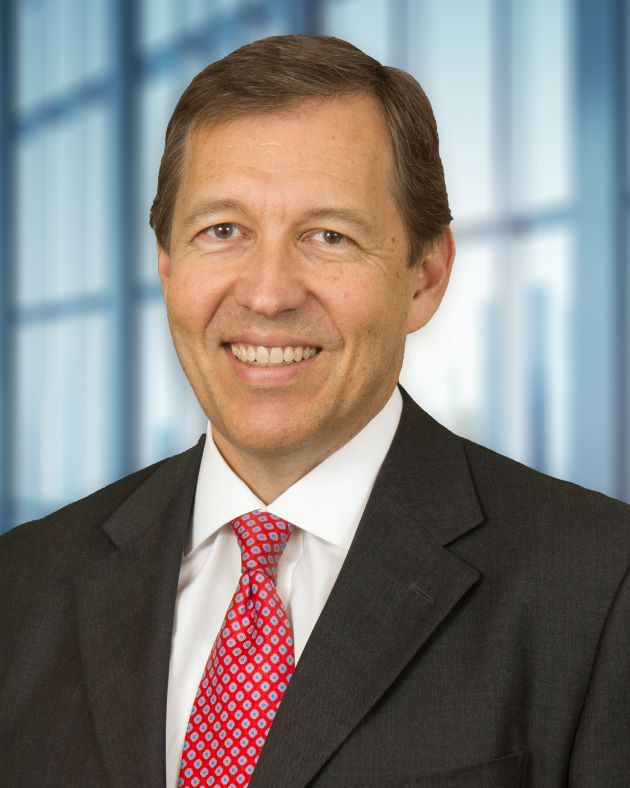A packed housed enjoyed a breakfast June 14 presented by the Naveen Jindal School of Management’s Institute for Excellence in Corporate Governance (IECG). The audience absorbed two panel discussions centered around private equity, especially current trends and market conditions. Grant Thornton sponsored the breakfast, allowing participants to attend on a complementary basis.

Albert McLelland, independent director and audit committee chairman for Breeze Holdings Acquisition Corp., moderated the first panel on “trends in private equity sponsors’ search for portfolio company advisors and board members.” Panelists Diana Barr of One Rock Capital Partners, Eric Burgess of Grant Thornton LLP and Keith Pearson of Pearson Partners International discussed ways equity sponsors have changed the criteria used to find portfolio company (portco) advisors and board members.
“Generally in the past, the board [for a newly acquired company] was formed by the acquiring firm,” Burgess said. “Now those firms realize a need for diversity of thought.”
Pearson stressed that most private equity firms have internal talent assessors to properly assess the human capital of the acquired firms.
In response to a question about whether there has been a shift in private equity to look at stakeholder needs rather than simply acquiring a company to sell for a profit, Burgess said, “those are the firms we want to work with. Firms that look at human capital/firm culture. Firms that only looked at selling are not doing as well.” Person and Barr agreed that company culture is an important part of a company’s valuation.

Nichole Jordan, national managing partner of geography and central region managing partner for Grant Thornton LLP, moderated the second panel on “turbulent market conditions: investing in new portcos amid high interest rates, lower lending, managing current loans, buying and selling.” Panelists Brendan Achariyakosol of Evolute Capital and Dana Silaski of Stephens Inc. discussed current market conditions faced by private equity firms and what their experience informs them about upcoming market conditions.
Members of both panels agreed that while the overall number of acquisitions dropped this year, the value of the acquisitions was higher. All are expecting a busy summer based on the amount of private equity capital available and the variety of firms seeking investment opportunities.
Achariyakosol and Silaski discussed the resiliency of mission critical companies; companies that break ground for utilities, information technology services companies, vegetation management companies, infrastructure companies and other necessary businesses. Silaski pointed out that these businesses’ “long-standing customers, strong history, strong teams, weather downturns well,” which makes them good candidates for successful acquisition.
Achariyakosol stressed that diligence is important. He recommended that firms dig deeper into customer stability in addition to company stability before making an acquisition.
Harkening back to the previous panel, Achariyakosol and Silsaki explained the importance of a diverse panel with a variety of expertise is crucial to helping private equity companies be adequately prepared for the challenges ahead after acquiring a new company.
Silaski emphasized that an advisor for a portfolio company should find out what success means to the owner of the company that is for sale.
“Some owners want new markets and more profits. Some want to grow the company with the same culture,” she said. “Some owners will want to leave immediately after selling, others are willing to stay for a while. Assemble the right team, share with them your goals, find out as much as you can ahead of time.”
Achariyakosol recommended that private equity companies “match board members with the life cycle of the company in addition to expertise in the industry. Growth is different than going through difficulty.”

Breaks between panels and at the end of the breakfast gave attendees time to reflect on the discussions and network.
Marshall Weinrich of Intista said the panelists impressions of current market conditions and future trends tracked with his assessments. He declared he was looking forward to the fall and felt a lot of valuable companies did not want to sell at the low end.
Chandra McCormack of OptimEyes stated that she appreciated that company culture was being noticed as an important factor in acquisitions.
“IECG, Grant Thornton, and Pearson Partners are a strong line-up with excellent reputations that never disappoint—they remain strong supporters of local talent, and the quality of their events is consistently high caliber, and the time spent worthwhile,” she said. “The event was well attended and offered a unique opportunity to meet board members and advisors across industries and organizations, including PE, private, nonprofit and even public. It was terrific to hear from PE and practice leaders that markets were opening and improving, including mention of momentum with new boards forming, after market activity slowed substantially last Fall. Many of the speakers mentioned wanting to build their networks, and offered introductions to further engage, while also offering keen insight into how they evaluated talent and viewed leadership and diversity to steward their ventures.”
Debra von Storch, who has experience on boards of various types, said the discussion was outstanding and offered ways to navigate today’s governance headwinds.
“The event provided great, thought-provoking content with engaging speakers,” she said. “The IECG ecosystem is strong and robust. It was definitely a positive learning experience for board members in today’s dynamic environment.”

After the event, Gregg Ballew, executive director of IECG and a professor of practice in the Accounting Area at the Jindal School, said it was rewarding to see such an enthusiastic response from the attendees.
“As our name implies, the Institute for Excellence in Corporate Governance promotes best practices among people involved in corporate governance,” he said. “I am particularly pleased that the Jindal School can assist those most interested in creating successful outcomes for their organizations.”
This story was reported and written by Kristi Barrus.





